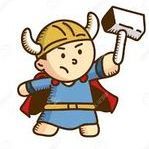The other approach I've considered in lue of grinding is enforcing a better notion of party composition (Does this battle scenario warrant a fighter/White Mage/Archer, etc. or a Thief/Black Mage/Necromancer, etc. ) In conjunction with leveraging the terrain the battle takes place in.
Effectively a tactics clone that throws stats like HP/Vitality out the window, and goes with the idea that a sword swipe across the mid-drift is indeed a killing blow without some immediate medical intervention on the field, and the idea of sheltering members of the party behind obstacles to completely negate projectiles, and flanking to overcome defense and agility modifiers. Most RPGs have this, but the stakes could always be higher, e.g. an arrow to the thigh/chest without armour despite your level should hit a major artery, and cause your movement to be impeded, and start a clock of you bleeding out (bloodied as it were) until a white-mage can heal you. Of course, making something like this work without being overly punishing on the player would entail its own complications, but I do believe it can work.
Leveling up/Grinding is a staple of both Western, and Japanese RPGs, but it's not a requirement imho, just look at FF VIII. It discouraged pure grinding as enemies leveled up beside you making it a break-even award. Instead you were incentivized to use the junction system instead and to keep the party's average level low.
Really, when it comes down to it. A lot of RPGs feel a bit artificial to me when leveraging vanilla leveling systems with incremental increases with stats. I guess it's the idea of going from a level x nobody to a level xxx demi-god within the duration of the game that irks me a bit.
I like the idea that despite your speed/defense, armor, magic, intelligence, at the end of the day, an arrow to the knee IS, IN FACT, an arrow to the knee.









